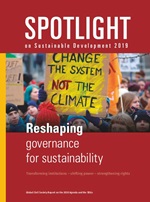Social Watch News
|
Source: . Published on Fri, 2019-09-20 10:07
La quema de la Amazonía, el "pulmón del planeta”, especialmente en Brasil, llegó esta semana a un largo y apasionado debate en el pleno de la Eurocámara. La preocupación común no se traduce, no obstante, en una visión compartida de en dónde buscar tanto culpas como soluciones. Con todo, el acuerdo de la UE con los países del MERCOSUR, logrado en junio de 2018, es el principal sospechoso de la quema de bosque para ganar tierra agroganadera. |
| Published on Thu, 2019-09-19 10:36 |
Published on Wed, 2019-09-18 21:03
With the focus firmly on preparations for the UN General Assembly (UNGA) High-Level Week (23-27 September), the Presidents of the General Assembly (PGAs) and the UN Secretary-General expressed their concerns and ambitions in closing the 73rd Session and opening the 74th Session. While the UNGA High-Level Week will feature high-level meetings on climate, universal health coverage, financing for development, the Sustainable Development Goals (SDGs), and solutions for Small Island Developing States (SIDS), the UNGA’s remit goes far beyond that week, with meetings spanning the entire year, and a new session beginning each September. |
| Published on Wed, 2019-09-18 00:00 |
Published on Mon, 2019-09-16 12:09
The 2030 Agenda for Sustainable Development clearly identifies several issues, ranging from finances, to climate to trade, where global governance agreement is required. But actual decisions on these issues often run in the opposite direction. Non-accountable ‘clubs’ exercise de facto authority and raise obstacles to implementing the SDGs. While leaders of all UN Member States decided on a transformative agenda for 2030, a de facto form of global governance, sometimes called ‘shadow governance’, works in the opposite direction. Operating in opposition to global norms as self-selected ’coalitions of the willing’ or in the interstices of national sovereignties-such as the global ‘shadow banking’ where illegal financial flows meet established financial arrangements- these major obstacles to achieving the SDGs are not loose trends or wild forces beyond control, but rather the result of a secretive but efficient network of governance ‘clubs’ that operate beyond public scrutiny or parliamentary oversight, the two accountability mechanisms identified in the 2030 Agenda. |
Published on Mon, 2019-09-16 12:00
Climate change is increasingly making its impact felt worldwide. Everyone is suffering, but the poor in the developing world is bearing the brunt of the impacts. It is not fair that those who did not contribute to the problem of climate change are suffering the most, and sometimes even paying with their lives. The developed world, historically responsible for causing climate change must own responsibility and fulfil longstanding commitments to reduce emissions and provide developing countries the means—finance, technology, capacity building—to deal with climate change. Under the Paris Agreement on climate change countries agreed to climate action via nationally determined contributions (NDCs). Developed countries have been mandated to help developing countries with the means to achieve their climate goals. However, they have reneged on their commitments time and again. This cannot continue. |
Published on Mon, 2019-09-16 11:23
Arab NGO Network for Development (ANND) hosts an electronic platform to share information and reports on the progress in the implementation of the Agenda 2030 for Sustainable Development issued by CSOs in the Arab Region. |
Published on Fri, 2019-09-13 13:22
Civil Society watchdog says the UN week of summits 23-27 September could see more positive action on the climate emergency, on implementing the Sustainable Development Goals and could change the direction of financing for development. |
Published on Wed, 2019-09-11 12:06
Four years after the adoption of the 2030 Agenda the world is off-track to achieve the Sustainable Development Goals (SDGs). In order to turn the transformational vision of the 2030 Agenda into real transformational policies, there needs to be a shift towards more coherent fiscal and regulatory policies. In addition, policy coherence for sustainable development requires to fully take into account the externalities and spill-over effects of European policies, production and consumption patterns. With an emphasis on environmental and social impact beyond our borders, the "Spotlight Report Sustainability in Europe. Who is paying the Bill?" will be presented in Brussels on September 11, 2019. |
| Published on Tue, 2019-09-10 15:05 |
SUSCRIBE TO OUR NEWSLETTER









